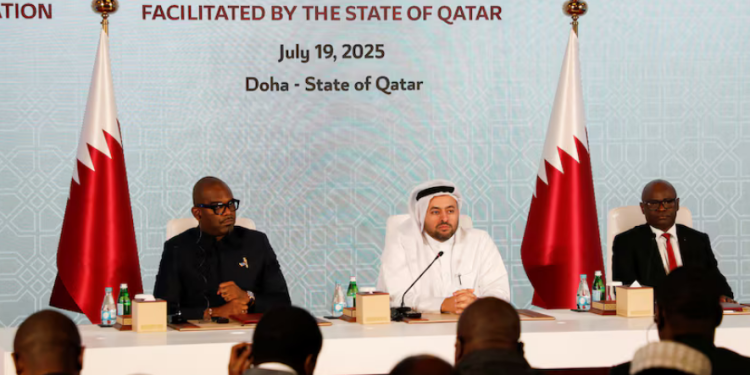The Democratic Republic of Congo and the M23 rebel group pledged to sign a peace agreement by August 18, at a ceremony in Doha on Saturday, a sign of progress even as outstanding details need to be negotiated.
Representatives of both sides signed a declaration of principles laying out the new timeline, a copy of which was obtained by Reuters, at the ceremony that followed months of Qatari mediation after talks began in April.
The United States, which has hosted separate talks between the governments of Congo and Rwanda, has exerted pressure to finalise a durable peace deal in Congo. President Donald Trump has made clear he hopes that it would spur Western investment into a country rich in tantalum, gold, cobalt, copper, lithium, and other minerals.
Last month, the Rwandan and Congolese foreign ministers signed a peace deal and met with Trump at the White House.
The rebel group M23, in the latest of a series of uprisings, has controlled
Goma, eastern Congo’s largest city, since late January and has also made gains across North Kivu and South Kivu provinces.
Rwanda has long denied allegations that it has helped M23, which has seized more territory in Congo than it has ever previously held. The fighting has killed thousands and displaced hundreds of thousands more this year, while escalating the risk of a full-scale regional war. Several of Congo’s neighbours had troops deployed in eastern Congo when the advance began.
Qatar’s Minister of State for Foreign Affairs Mohammed bin Abdulaziz Al-Khulaifi said at a news conference Saturday’s declaration “lays the groundwork for a new phase of partnership among the various components of society in the Democratic Republic of the Congo – including armed movements that have chosen to prioritise the greater national interest.”
It was brought about by talks that followed a surprise meeting between Congolese President Felix Tshisekedi and his Rwandan counterpart Paul Kagame, brokered by Qatar in March, during which they called for an “immediate and unconditional” ceasefire.
Congo had previously rejected the idea of holding talks with M23, branding it a terrorist group.
While denying it has supported M23, Rwanda has said its forces have acted in self defence against Congo’s army and ethnic Hutu militiamen linked to the 1994 Rwandan genocide.
POINTS OF CONTENTION
Sources in both delegations have expressed frustration with the pace of negotiations in Doha and the lack of progress on confidence-building measures including the release of M23 members held by Congo and the re-opening of banks in rebel-held territory.
The declaration of principles does not resolve those issues, instead committing the parties to “creating the necessary conditions” to eventually do so.
It also does not address bigger questions concerning the possible Rwandan and M23 withdrawals from eastern Congo. It says Congo and M23 agree state authority should be restored “on all national territories” as part of an eventual peace agreement but does not give details.
Congo government spokesperson Patrick Muyaya nevertheless said on X on Saturday that the declaration “takes into account the red lines we have always defended, including the non-negotiable withdrawal” of M23.
Negotiations for a peace agreement are to start no later than August 8, according to the declaration, which would give the parties less than two weeks to finalise a deal if they stick to their new August 18 deadline.
“We are confident and we are hopeful,” Massad Boulos, Trump’s senior adviser for Africa, told Reuters after Saturday’s ceremony in Doha, adding that Tshiskedi and Kagame “have both committed to resolving this.”
Sompaonline.com.

